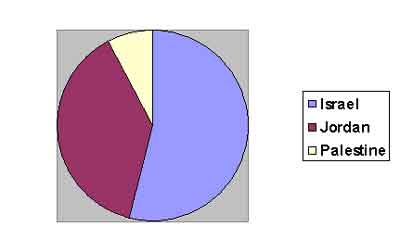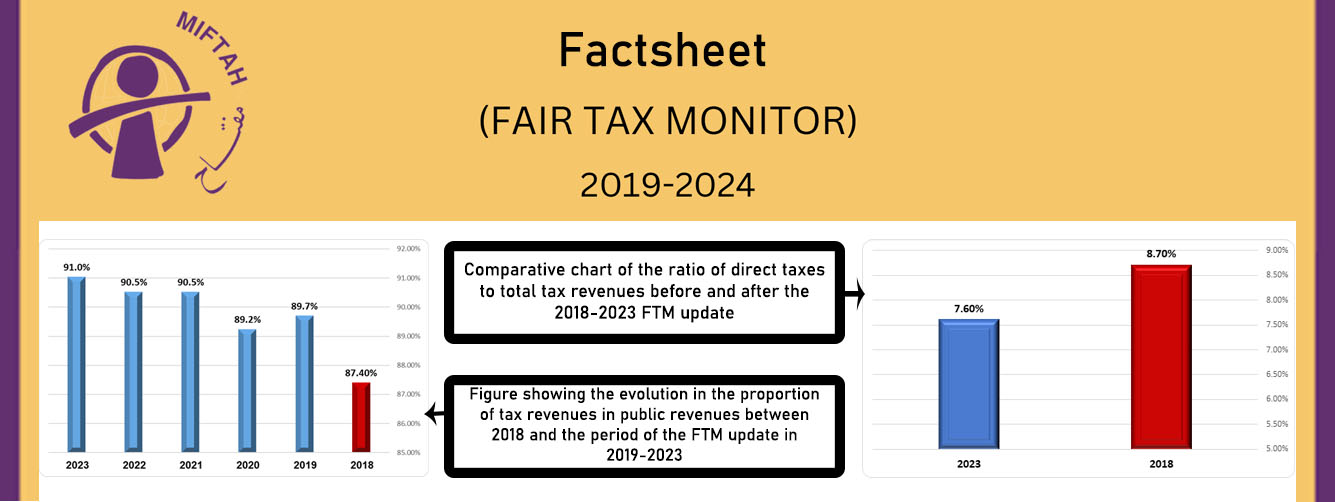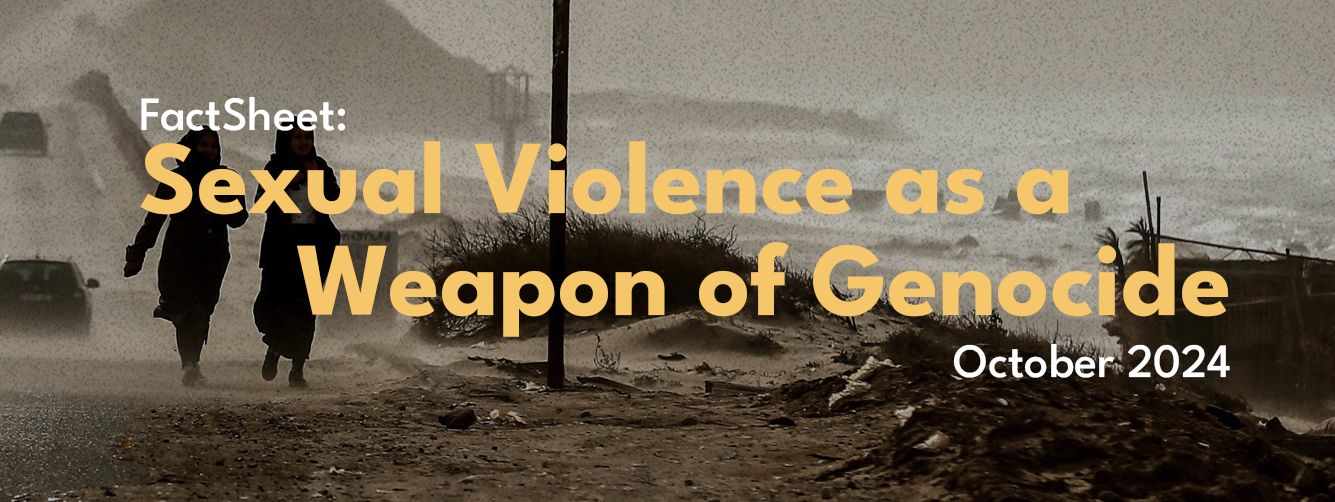While perhaps one of the less dramatic aspects of the Middle East conflict, water is definitely one of particular importance, serving as a strategic imperative and major concern for the parties involved, in particular for the state of Israel, throughout the history of the conflict.
In a characteristically water stressed environment, Israel has used its occupation of Palestinian territories to maintain a systematic policy of water over self-appropriation on the expense of the Palestinian people who having been “dehydrated” as a result.
The following seeks to provide a brief overview of the facts necessary to place the issue in an informative perspective.
Introduction
The water conflict in the Middle East is not only a question of political, economic, and strategic gain; it is essentially a question of survival. From the beginning, a major motivation for Israel, both in its military and political strategy, has been the control of as much of the region’s water sources and resources as possible.
Since Israel’s 1967 occupation of the West Bank and Gaza, it has forcibly controlled all the water resources in those areas, effectively sentencing the Palestinian population to a “parched life.”
Israel’s illegally exploitation of the Mountain Aquifer and Jordan River basin, according to some historians has been an underlying reason for its invasion and occupation of the West Bank.
One of the first military orders of the occupation was the confiscation of almost all West Bank wells. Since then, drilling for new wells has been banned and quotas have been imposed on the existing ones. The amount of water allocated to Palestinians has been capped at 1967 levels, despite the subsequent growth in population.
Israeli attempts to divert water from the Jordan-Yarmouk River basin into the Negev were a key source of the 1967 war. The Golan Heights, which Israel still refuses to give back to Syria, are also water rich.
The Palestinian economy, chiefly agricultural, provides 33% of the GDP, employs 14% of the workforce and accounts for 64% of the total amount of water used. In Israel, agriculture accounts for less than 3% of the GDP, 4% of the workforce but 57% of the total water used.
The following graph compares water usage between Israel and the occupied Palestinian territories, as a factor in labor, GDP and agriculture.
Water Sources – Aquifer
The two main sources of “renewable” water in the Occupied Territories that the Palestinians are entitled to access by international law are;
1. Ground Water,
i. (a) Western Aquifer Basin
ii. (b) Eastern Aquifer Basin (Mountain Aquifer)
iii. (c) North-eastern Aquifer Basin
2. Jordan River
1. The aquifers are a system of underground basins that transect the borders between Israel and the West Bank. The eastern aquifer lies completely on Palestinian territory.
2. The Jordan River is divided into two parts, namely the Upper and Lower Jordan River. By law the latter should be shared by five riparian parties, namely: Lebanon, Israel, Jordan, Syria and the occupied West Bank. Palestinians hove however been denied their entitled share since Israel’s occupation of 1967.
Alternative Water Sources:
As the region is gravely water stressed, alternative water sources are essential to meet the demographic growth and natural development. The pressure on the natural sources of water will need to be mitigated to avoid their devastation.
1. Sewage water treatment could serve irrigation and agriculture purposes.
2. Sea water desalination, despite the high cost involved could become critical.
3. Traditional water wells continue to be viable resources, and its significance as an irrigation resource for Palestinians, especially in smaller communities could be restored if Israeli restrictions are removed.
Israeli & Palestinian Water Usage, a Comparison:
Israel (as an occupying power) utilizes more than 85% of the water resources, thus leaving the Palestinian population with a mere 15% for survival.
Today, Israel uses 79% of the Mountain Aquifer and all of the Jordan River basin – bar a small quantity that it sells to the Palestinians in Gaza. The result is apartheid in all but name. The amount of water at the disposal of the Palestinian territories is only one third of the amount required to meet basic survival and sanitation needs.
The following pie chart shows the average yearly per capita water consumption for Israel, Jordan and the Palestinian territories.
A rapid glance at the annual water use per capita in three countries in the region highlights an alarming and unacceptable discrepancy. While Israelis enjoy 344m3 per capita, Jordanians are limited to 244m3 each, and Palestinians have to survive on 93m3. In terms of domestic usage, the average Palestinian is limited to 39-50 liters per capita per day, 220 liters per capita less than Israelis.
Instead of the minimum of 150 liters daily per person, recommended by the World Health Organization, Palestinians have to make do with only 50-85 liters and an ongoing severe shortage of running water. In contrast, in the surrounding Jewish settlements each settler is provided with 280 to 300 liters daily.
The settlers’ unlimited quantity of running water has served to fill swimming pools and to water ornamental lawns. In the meantime, Palestinians have become increasingly unable to use water for irrigation, or even to water backyard family vegetable plots. Agriculture, as the major Palestinian source of income, has been devastated.
Gaza
In Gaza, where water is significantly overwhelmed by qualitative and quantitative problems, it is estimated that one million Palestinians have to make do with 25% of the available ground water, while the remaining 75% go to a settler population of around 7,500. As a result the water table in Gaza has been drastically decreased, sinking to below sea level, thus becoming contaminated to the degree that it has become unfit for human consumption. It is also rapidly becoming unsuitable for irrigation purposes, unless drastic measures are immediately adopted.
Israeli Restrictions
Since the resurgence of hostilities in September 2000, Israel has regularly made it close to impossible for water tankers to enter Palestinian areas -- or for villagers to get to nearby wells. B'Tselem, the Israeli human rights group, says Israeli soldiers have gone as far as deliberately spilling the transported water and sometimes physically and verbally assaulting tanker drivers.
Towns with connections to the water network also face problems, according to Ayman Rabi, of the Palestinian Hydrological Group, Israeli settlers attack Palestinian water supply by severing pipes and turning off water valves. The dumping of untreated sewage on Palestinian land, thus polluting wells and aquifers, has also been a common practice taken up by the settlers. The Israeli army has also been involved in disrupting water supplies by frequently destroying water infra-structure and the like, an activity defined as a war crime by international law.
Israel continues to maintain almost absolute control over water in the occupied territories. All water related works, from drilling a well, laying pipes, building a reservoir or simply renovating existing water infra-structure requires Israeli approval through the Joint Water Committee.
Israel’s Position
The general Israeli position on the water issue has, so far, been vague and misleading. Israel maintains that there are no real water resources to be compromised for peace; Palestinian efforts to find a solution with Israel over water issues are often stalemated by the latter’s insistence that the only real options for the Palestinians are either “desalination” or imported water from neighboring countries.
The Israeli suggestions do not constitute valid alternatives, as from a practical point of view, the costs involved in desalination or water import would be prohibitively high. More importantly however, Israel’s rationale that the scarcity of the water supplies is reason enough to deprive Palestinians from their fair share is faulty, as the water resources in question lie under occupied Palestinian territory and not Israeli, and are de jure Palestinian water that the latter is entitled to under international law.
International Laws
On this vital issue, Israel remains in grave violation of The Hague Regulations, the Fourth Geneva Convention, and the International Covenant on Economic, Social and Cultural Rights, as;
The Fourth Geneva Convention article 53 states:
"Any destruction by the Occupying Power of real or personal property belonging individually or collectively to private persons, or to the State, or to other public authorities, or to social or cooperative organizations, is prohibited, except where such destruction is rendered absolutely necessary by military operations."
Article 43 of the 1907 Hague Regulations states:
“The authority of the legitimate power having in fact passed into the hands of the occupant, the latter shall take all the measures in his power to restore, and ensure, as far as possible, public order and safety, while respecting, unless absolutely prevented, the laws in force in the country."
Article 55 states:
"The occupying State shall be regarded only as administrator and usufructuary of public buildings, real estate, forests, and agricultural estates belonging to the hostile State, and situated in the occupied country. It must safeguard the capital of these properties, and administer them in accordance with the rules of usufruct."
Article 27 of the Fourth Geneva Convention:
"Without prejudice to the provisions relating to their state of health, age and sex, all protected persons shall be treated with the same consideration by the Party to the conflict in whose power they are, without any adverse distinction based, in particular, on race, religion or political opinion."
Political Agreements, OSLO, Geneva
The peace process as initiated by the Oslo Accords marked the water issue as an interim issue, which was postponed to permanent status talks. A Palestinian Water Authority was established, which managed the Palestinian water sector. The flow and volume of water for use by Palestinians was however still controlled by Israel.
The deficient resolution of the water issue during the Oslo process, together with recurrent Israeli elusion of its commitments under the Oslo agreement, led to a continued Palestinian suffering from a severe water shortage. Moreover, the agreement maintained the previous conditions of inequality, and upheld blatant discrimination between the large indigenous Palestinian population and the transplanted Israeli settler groups.
The effectively continued control of Palestine water resources meant that of the 450 million m of water requested by Palestinians only 28.6 m were provided by Israel. The tremendous current water deficiency is expected to be aggravated by the estimated future needs of 70-80 m.
So far, water issues have been neglected in political agreements, under the claim that a solution regarding water will not be reached until the crucial political matters are resolved.
The non-official Geneva Accord that was signed by Israelis and Palestinians officials in Geneva, on November 4th, 2003, has yet to produce its articles on this matter.
Impact of Separation Wall
The path of the Israeli separation wall lies virtually on the same line of the western aquifer, making it inaccessible to Palestinians, and further solidifying Israel’s control over the quality and quantity on water to reach Palestinians.
Reports to date have identified over 50 wells that were directly affected by the barrier construction, and destroyed. This figure does not account for wells that have been made inaccessible by lying behind the wall. For example, 9 wells in the community of Hable in Qalqiliya district, were either isolated or placed in the buffer zone with the estimated discharge of around one million m3/year.the estimated discharge of all 50 wells reaches up to around seven million m3/year
At least 32 groundwater wells, with an approximate total discharge of 4 MCM/year, are expected to be affected by the construction of the Wall in this first phase alone, these groundwater wells are located near the western water Basin; consequently, Palestinians are expected to lose 18% of their share in this basin.
The major brunt will hit the agricultural sector, which depends heavily on water well as a source of irrigation, with many of its irrigation channels and networks severed and much of its lands reduced not cultivatable.
Environment Aspects of Israeli Water Overuse
As a result of water over-drawing of parts of the Coastal Aquifer lying under Gaza, the water table in Gaza has been drastically decreased, sinking to below sea level, and thus becoming contaminated to the degree that it has become unfit for human consumption. Unless drastic measure will be taken soon, it will rapidly become unsuitable for irrigation purposes.
Over-extraction from the Jordan River has been the main reason for a drop of nearly 90 % in its flow over the last 50 years. It has thus been reduced to a small stream, too small to replenish the Dead Sea, leading hydrologists to predict that it won't exist in 50 years.
Israeli Water Control – Mekorot
Israel was able to monopolize the water resources of the Occupied Territories through the mechanisms of Mekorot; a private Israeli water company operating on behalf of the government. The outcome, predictably, has been a discriminatory policy against the Palestinian population.
When supplies run low during the summer months, Mekorot frequently shuts off the valves that supply Palestinian towns, often for days on end. While settlers get their swimming pools topped up, Palestinian villages a few miles away run out of drinking water.
Hebron as an Example
In Hebron, where a Jewish settler population was planted in and around the city, it is estimated that 70% of the water in Hebron goes to an estimated 8,500 settlers and 30% goes to the city's 250,000 Palestinian inhabitants. The Palestinian Water Authority is incapable to increase the supply available to the Palestinian population of Hebron as this is controlled completely by the Israeli Water Authority.
The following graph amplifies the inequitable water usage in Hebron, stated in %
During shortage, those who can afford it purchase tanks of water from the Hebron Municipality, which are trucked in. The Hebron Municipality rotates the meager supply of water in the pipes from neighborhood to neighborhood. Once every fifteen days it is turned on in each area. However, the weak water pressure is often too low to refill many of the residential tanks, forcing many people to install electric water pumps to refill their rooftop tanks, or carry water in buckets and effectively reducing their water consumption.
Yunis Muhammed 'Abd Jabarin, a father of eight from a village in southern Hebron described how the water supply would be disrupted for 10 to 20 days at a time sometimes, forcing his family to request water from neighbors. The situation has become intolerable to the point that Yunis and his family have been unable to shower more than once every five to seven days.
In Conclusion:
Israel’s reluctance to relinquish control of West Bank water, while not surprising, is an insurmountable impediment to any peaceful solution to the conflict. Israel will have to share water sources equitably, and according to international law. Water supplies need to be used in a more sustainable manner by Israel. It is perplexing to see how Israel continues its water policy, seizing what is lawfully Palestinian water, and systematically “dehydrating” a population of its water, while private Israeli swimming pools continue to be filled up, and green lawns watered.
Israel’s occupation of Palestinian territories has been a secure source of water for Israel for almost the last three decades. The omission of meaningful and sustainable resolutions to the water issue in the Oslo Accords, and the subsequent agreements together with the path of the Israeli Separation Wall allow many to realize how important Israel’s control of Palestinian territories and its resources really is for Israel’s welfare, and the extent Israel is willing to go to keep that control.
SOURCES:
Negotiations Support Unit www.nad-plo.org
PASSIA www.passia.org
B’Tselem www. www.btselem.org










